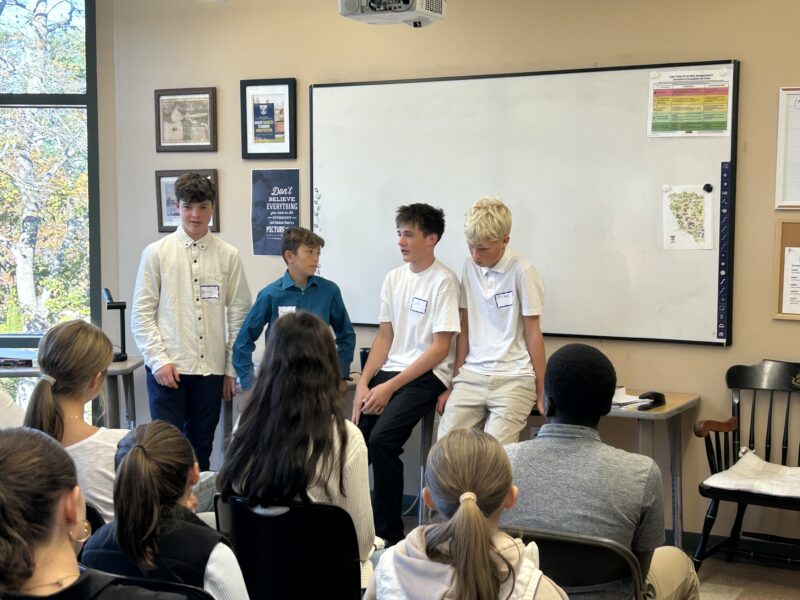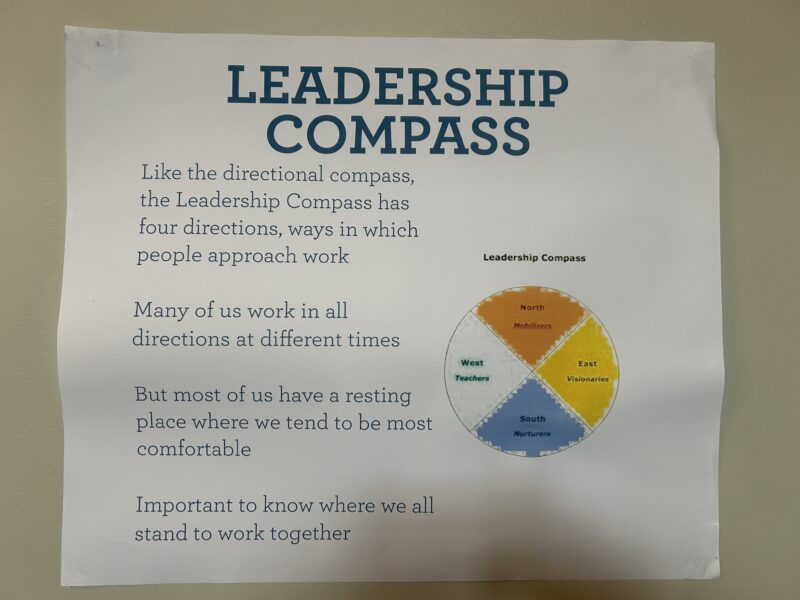Two weeks ago, I’m sitting in the third row of a conference room. A couple of coat-and-tied enthusiastic 30-somethings are up front, working the easel, commanding the Power Point. They’re using words like “Courage”… “Integrity”… “Brother’s Keeper”… and “Seminar.” They’re throwing around terms like “Clear the Decks” and “Action-Reflection Cycle” while talking about “The Discovery Process.”
A training session for new Hyde teachers? No… An info session for new Hyde parents? Nada… A promo presentation at a Hyde admissions gathering? Nope.
First off, I’m hundreds of miles from Hyde, in State College, PA attending a conference for middle school educators – of which I am not – at Penn State. For another, I barely know the two presenters. (One I’ve never laid eyes on.) They’re both from Upper Dauphin (PA) Middle School, one of three schools honored the night before by the conference as a new “School to Watch.” (According to three criteria: academic excellence, developmental responsiveness, and social equitability.) So, we’re listening to these guys attribute this honor to the benefits of the program they are describing.
The two presenters describe their primary goal as “a positive school environment through a highly organized character development program.” As they observed, “Every school has a culture by default or design.” (Ain’t that the truth?!?) The program they outlined at Penn State has its roots in the philosophy and program practiced for the past half-century at… (drum roll)… Hyde School. Similar programs are up and running at neighboring schools in Halifax and East Pennsboro. (For you geographic thinkers, think of these three communities as rural suburbs of the capital city of Harrisburg.) Sitting there in that conference room, my range of emotions would all be filed under “How Cool Is This?!?!?”
1993 – Enter Bob Hassinger
How did all of this come about? The story begins 25 years ago when Bob Hassinger began his tenure as principal of Halifax Middle School. On Day #1, Bob found himself deeply troubled by the behavior of some of his eighth graders. It seems they were cutting the lunch line and cordoning off sections of the cafeteria where only they, the self-appointed “cool kids,” could sit. Added to this, only a few days later he joined his middle school students at a football rally at the high school where he was quickly appalled by the behavior of the high school students and highly concerned by the example they were setting (or not setting) set for his students. Departing the rally, he knew he had a culture problem on his hands. On the one hand, he was not sure where to begin. On the other, he had a sense that the solution would not lie in more of what teach-to-the-test advocates call “time on task.”
Around this time, a copy of Joe Gauld’s Character First – The Hyde School Difference (Institute for Contemporary Studies, 1993) found its way into Bob’s hands. He then heard the author speak at a conference. He departed with a sense that there may be something in what he had read and heard that could help him with his culture problem.
Bob’s earliest efforts to develop what has come to be called The Discovery Process included conversations with Joe Gauld and visits to Bath to see Hyde in action. In transferring what he saw in Bath to what he wanted to do in Halifax, one of his first moves was one that Hyde folks might take for granted but was a major source of controversy in his community: the reorganization of the school’s homerooms from their traditional grade-specific formats to a grade-diverse format. In other words, instead of the exclusively 7th grade homeroom I experienced at Bath Junior High (circa 1966), Bob designed the homerooms at Halifax Middle School as a mix of grades 5-8. Many parents of 5th graders did not want their children exposed to, shall we say, the social mores of 8th graders and were worried about a range of issues from bullying to experimentation with sex and substance. By the same token, many 8th graders didn’t want a bunch of 5th graders getting in the mix of the aforementioned social mores. While this same resistance has since come to be an expected obstacle at the launching of new Discovery Process programs, this 3-minute video produced by the East Pennsboro Middle School speaks to the way the idea has ultimately been received:
In addition to reorganized homerooms, the program features characteristics familiar to anyone who has spent time at Hyde: The 5 Words & 5 Principles, a student jobs program, participation in performing arts, intramural athletics, and community service. They seminar. They Clear the Decks. They also keep copious data on the outcomes of the program.
At risk of understatement, the data is impressive. For example, during the 2013-14 school year, there were 509 student discipline incidents at Upper Dauphin. Since instituting the program in 2014, these numbers have plummeted to a low 277 and a high of 340 for an average decrease of 40%. Incidents of truancy decreased from 367 in 2013-14 to 336 in Year #1 and down to 258 in Year #3. A current survey indicates that 77% of the students agree or strongly agree that “the discovery program has made the school a better place.” Similarly, 74% agree or strongly agree that “my discovery teacher and class genuinely care about my thoughts and needs.” While Hyde students have been known to complain about our jobs program, they might be interested to learn that 80% of the East Pennsboro students agree or strongly agree that “school wide jobs help us take responsibility for keeping our school clean and in good shape.” [Note: There was strong student (and parent!) resistance to the very idea of student jobs when the program was first announced.]
However, as is often the case, it is the anecdotal evidence that pulled my heartstrings. There was:
– The East Pennsboro eighth grader who told me, “I used to be afraid to go to school because of all the bullying. Now I like to go to school.” (Note: The East Pennsboro program is in its inaugural year.)
– The principal who said to me, “We used to have a lot of fights, but since starting this program, they have basically stopped. And as for bullying, we don’t even talk about it. It just doesn’t happen here anymore.”
– The assistant principal who described the Discovery Group as an effective arbiter between the student body and his office: “Every little thing used to come directly to me. Now the Discovery Group assists in steering kids the right way. This sends fewer kids to me which, in turn, improves the quality and outcomes of the academic day.”
– The Halifax kids in one of the Discovery Groups earnestly engaged in “the mat challenge.” (See photo)
– Perhaps My Favorite Story: One school board member initially disagreed strongly with the idea of the age-mixed Homeroom for her 5th grade son. Then when she organized her son’s birthday party a few months later, she was both surprised and puzzled to find the invites to be a mix of 5th, 6th, 7th, and 8th graders. When she asked her son to explain his guest list, he responded simply, “Oh, Mom, those are just the kids in my Discovery group.” After the party she called the school principal and said, “OK, I get it. I’m sold.”
How do we scale this thing?
Last August, Joanne Goubourn ’75, my father, and I held a daylong meeting in Baltimore with a trio we have come to affectionately and respectfully call “The 3 Amigos.” Left-to-Right in the above photo: David Hatfield (current Halifax asst. superintendent for curriculum), Jared Shade (principal, Upper Dauphin HS), and Bob Hassinger (retired principal and superintendent in Halifax). Out of this discussion, The Hyde Public School Solution (HPSS) was born. Our goal is to expand the number of schools offering and practicing the Discovery Process.
Next steps include:
- Produce a “How To” teacher’s manual consisting of philosophy, procedures, and exercises.
- Convene and conduct a conference in Harrisburg, PA on July 12-13 for teachers and administrators interested in adopting the Discovery Process in their schools.
- Present at conferences at Penn State (completed) and Rhode Island (April) to promote interest in attending our July conference in Harrisburg.
Our hope is that some of the schools attending the July conference in Harrisburg will choose to adopt the program. If you would like to learn more or know an educator who might benefit from HPSS, please join us in Harrisburg this July. Feel free to contact me directly to learn more.
Onward, Malcolm Gauld


